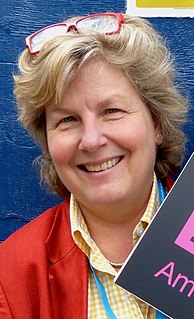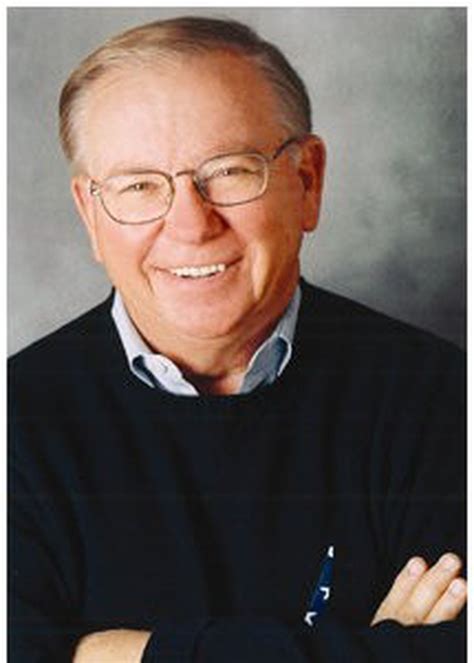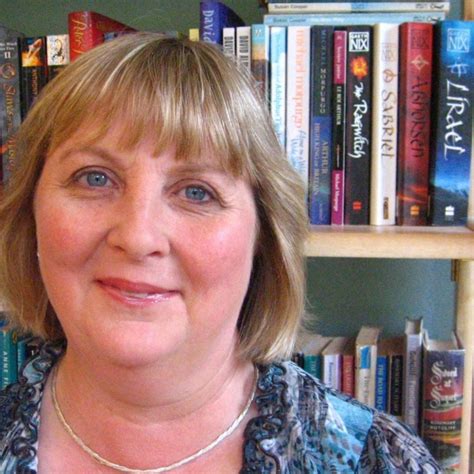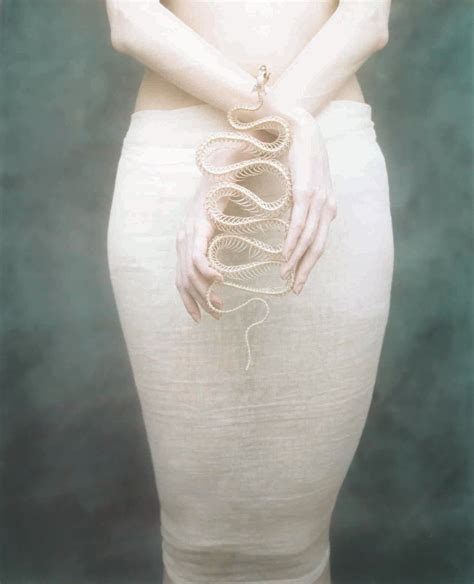A Quote by Sandi Toksvig
When I was a student at Cambridge I remember an anthropology professor holding up a picture of a bone with 28 incisions carved in it. "This is often considered to be man's first attempt at a calendar" she explained. She paused as we dutifully wrote this down. 'My question to you is this - what man needs to mark 28 days? I would suggest to you that this is woman's first attempt at a calendar. It was a moment that changed my life. In that second I stopped to question almost everything I had been taught about the past. How often had I overlooked women's contributions?
Quote Topics
About
Almost
Almost Everything
Anthropology
Attempt
Been
Bone
Calendar
Cambridge
Carved
Changed
Changed My Life
Considered
Contributions
Days
Down
Everything
Explained
First
Had
Holding
How
Life
Man
Man Needs
Mark
Moment
My Life
Needs
Often
Overlooked
Past
Picture
Professor
Question
Remember
Second
She
Stopped
Student
Suggest
Taught
Up
Woman
Women
Would
Wrote
Related Quotes
She had been ready to love this man from the moment she first saw him. In all these years, that had never changed. They'd hurt each other, let each other down, and yet, here they were after everything, together. She needed him now, needed him to remind her that she was live, that she wasn't alone, that she hadn't lost everything.
Why does a dad matter so much to a daughter, in particular? A dad is the one who teaches a daughter what a male is all about. It's the first man in her life--the first man she loves, the first male she tries to please, the first man who says no to her, the first man to discipline her. In effect, he sets her up for success or failure with the opposite sex. Not only that, but she takes cues from how Dad treats Mom as she grows up about what to expect as a woman who is in a relationship with a man. So Dad sets up his daughter's marriage relationship too.
She is fragile, she is soft, she is weaker, she is afraid. All around is a man-created world, and she is a stranger in it. She needs security. So when she falls in love, the first concept, the first idea, is how to be secure, safe. She would not like to make love to a man unless marriage is settled. Marriage has to be the first thing, then anything else can follow.
What do you think it would have been like if Valentine had brought you up along with me? Would you have loved me?" Clary was very glad she had put her cup down, because if she hadn't, she would have dropped it. Sebastian was looking at her not with any shyness or the sort of natural awkwardness that might be attendant on such a bizarre question, but as if she were a curious, foreign life-form. "Well," she said. "You're my brother. I would have loved you. I would have...had to.
She was unaware that she was somewhat of a celebrity up in heaven. I had told people about her, what she did, how she observed moments of silence up and down the city and wrote small individual prayers in her journal, and the story had travelled so quickly that women lined up to know she had found where they’d been killed. She had fans in heaven..... Meanwhile, for us, she was doing important work, work that most people on Earth were too frightened even too contemplate.
Her first reaction was one of hope, because his eyes were open and shining with a radiant light she had never seen there before. She prayed to God to give him at least a moment so that he would not go without knowing how much she had love him despite all their doubts, and she felt an irresistible longing to begin life with him over again so that they could say what they had left unsaid and do everything right that they had done badly in the past. But she had to give in to the intransigence of death. (Love in the Time of Cholera)
She had always told herself that she did hti job because she wanted to help others; afterall, hadn't Maurice told her once that the most important question any individual could ask was, "How might I serve?" If her response to that question had been pure, surely she would have coninued with the calling to be a nurse.... But that role hadn't been quite enough for her. She would have missed the excitement, the thrill when she embarked on the work of collecting clues to support a case.
My mother was very passionate about life and she would do anything for us. And she had to fight alone to raise us. We never had a lot of money for extras or anything. She had to work six days a week, and then she would do breakfast, lunch and dinner. She was a super-woman! For me, I don't know how she did it with three kids.
At first the music almost repelled me, it was so intense, and this man made no attempt to sugarcoat what he was trying to say, or play. It was hard-core, more than anything I had ever heard. After a few listenings I realized that, on some level, I had found the master, and that following this man's example would be my life's work.
Francie was ten years old when she first found an outlet in writing. What she wrote was of little consequence. What was important was that the attempt to write stories kept her straight on the dividing line between truth and fiction. If she had not found this outlet in writing, she might have grown up to be a tremendous liar.
On the board was a list of words and phrases which her mother considered not suitable for use in college T-shirt design. She had been asked about them so often that in the end she had started a blacklist of banned words to which everyone could refer. Every time someone thought of a new one, she unflinchingly wrote it down... Rose read through the list, and turned back to her letter. These are the words I learned to spell in Mummy's art class today, she wrote, and sighed a little as she began the tedious job of copying from the board.
Over the years I have photographed thousands of people. I have never stopped being curious and trying to discover new worlds. I have used my camera as a mirror for my subjects as well. I remember photographing a woman in her 80s for my book, Wise Women, who told me it had been a long time since anyone had really been interested in "seeing" or photographing her. When she saw the picture, she burst into tears. She saw something in the photograph, an inner beauty and soul, she felt had long ago vanished.
You know what the problem is? You can't put a woman into a man's role. A women's journey in life, I'm not speaking disrespectfully of women and their roles in life, but a woman's journey in life is very different from a man's. That doesn't mean a woman can't do a man's job, but it doesn't mean that a woman should do a man's job the way a man handles it. The things that men question themselves about in life are quite different from the things women question themselves about.





































